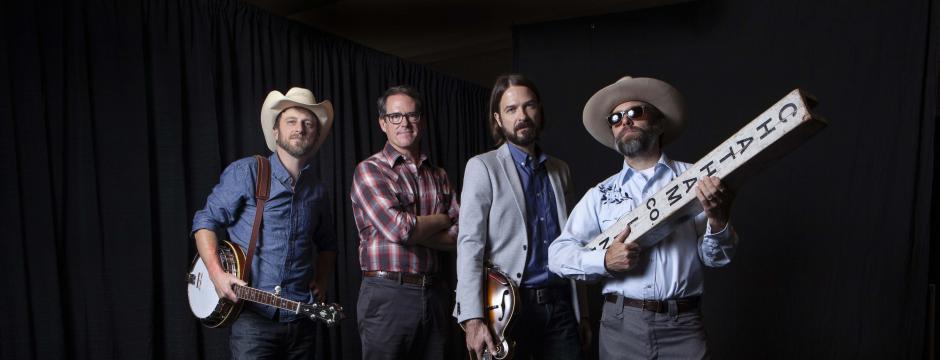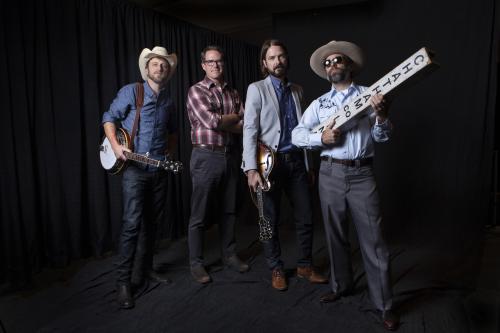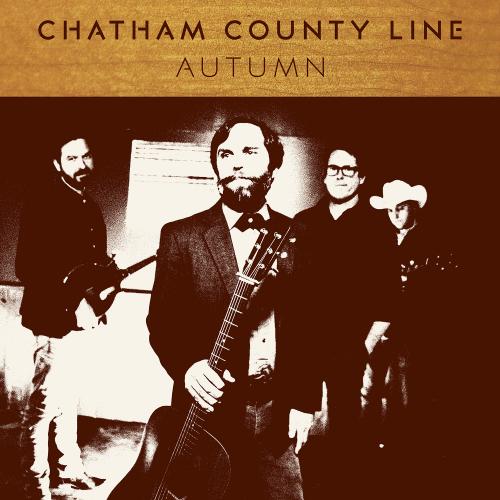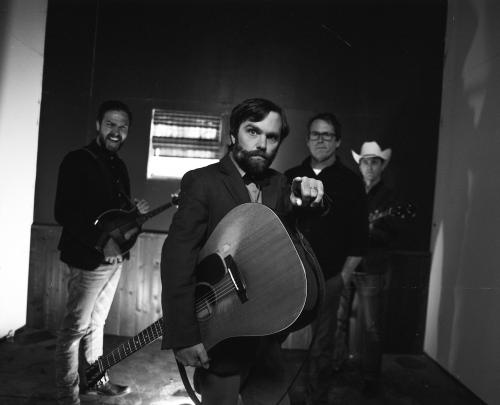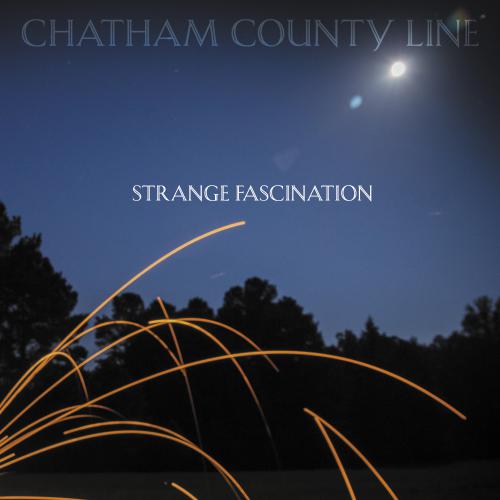Band: Chatham County Line
Album: Strange Fascination
VÖ: 15.05.2020
Label/Vertrieb: Yep Roc / Bertus Musikvertrieb GmbH
Bandwebsite: www.chathamcountyline.com
A staple of the North Carolina music scene for two decades, Raleigh, NC’s Chatham County Line introduces a new sound and line up with the release of their ninth studio album, Strange Fascination, out May 15 on Yep Roc Records.
“Station to Station,” the lead single, which adds to the band’s repertoire of train songs, debuts today; listen to the song here. Strange Fascination is now available for pre-order.
Twenty years into the band’s career, Strange Fascination marks a turning point in their steady growth and evolution, serving as both the final release with co-founding banjo player Chandler Holt, the first line-up change since 2001, and the first to feature drums on every song.
The core of CCL—Dave Wilson (guitar/vocals/songwriter), John Teer (mandolin/fiddle/vocals), and Greg Readling (bass/pedal steel/piano)—now welcome percussion to its line-up with long time friend of the band Dan Hall on drums. “We’ve had drums on several albums, most notably 2010’s Wildwood, and our audience always responded well to those tunes,” says Dave Wilson. A 10th-anniversary special edition of Wildwood will be released on March 6.
Produced by Dave Wilson and the band, Strange Fascination was recorded at Mitch Easter’s Fidelitorium Recordings in Kernersville, NC. The band was joined in-studio by Yan Westerlund (Mipso, Phil Cook) on drums, and the album was mixed and engineered by Chris Boerner (Hiss Golden Messenger, The Foreign Exchange).
From the dreamy “Oh Me Oh My” to the chugging rhythm bolstered by lively piano and harmonica of “Free Again,” a song that looks at the American Dream to “Queen Anne’s Gold,” a folk tale about the North Carolina coast which recounts the legend of Blackbeard and his shipwreck, Dave Wilson’s songwriting is “very true and honest,” says Greg Reading.
Further representing a new era for the band, Sharon Van Etten’s guest vocals on the title track mark the first guest vocals since the band’s debut. The title track also inspired the group to move away from their signature single microphone set up in live shows.
The band will embark on a spring and summer tour in support of the release beginning March 20, and will be special guest to The Avett Brothers at the annual Azalea Festival in Wilmington, NC on April 4. A full list of dates is below.
2019 was a banner year for CCL with Sharing The Covers, a collection that features interpretations of songs by Beck, The Stanley Brothers, and The Rolling Stones, among others, topping Billboard’s bluegrass chart. A second number one followed with Winter Stories, a collaborative album with American folk icon Judy Collins and Norwegian legend Jonas Fjeld.
In between tour dates with Collins and Fjeld, the band supported Steve Martin and Martin Short on the comedians’ Now You See Them, Soon You Won’t tour. They also made appearances at Merlefest, Telluride Bluegrass Festival, and AmericanaFest, among other festivals, and toured the U.S. extensively playing theatres and clubs.
May 16 – International Buhl Bluegrass Festival – Buhl, Germany
Strange Fascination Tracklisting:
1. Oh Me Oh My
2. Station to Station
3. Strange Fascination
4. Free Again
5. The Eagle and The Boy
6. Leave This World
7. Guitar (for Guy Clark)
8. Queen Anne’s Gold
9. Nothing
Info zum vorherigen Release:
Chatham County Line has never been shy about crossing borders. Birthed from country rockers Stillhouse in 1999, the Raleigh, NC-based quartet initially referred to its sound as new traditional, “We were in love with bluegrass, so we wanted to play bluegrass without really being trained in it,” Chatham County Line’s vocalist/guitarist Dave Wilson says. The group used the term “guerrilla bluegrass” to describe themselves in those early years, mainly because they had such a mobile form of playing.
“We don't need electricity to do anything, so we would play on street corners everywhere. We just thought we were kind of a traditional band as far as instrumentation.” But Wilson says they only got away with that for a short while after their eponymous 2003 debut, on a quest to find their own voice. ”We're rock and roll kids, and we came to it for the love of the genre and the style of performing.” He insists that nobody who knew bluegrass ever thought they were a 'grass band. “We're kind of an Americana band without drums, or a rock and roll band who doesn't plug anything in.”
The band's name comes from one of their very first practices when the then—unnamed group—Wilson on guitar, vocals, and harp; John Teer on mandolin and fiddle; Chandler Holt on banjo; and Greg Readling covering bass, pedal steel, and piano duties, were trying to find Holt's place in Chapel Hill and got lost. “We crossed the Chatham County line, and we never looked back,” Wilson says. “Just saw the sign, and said that’d be a good idea for a name, and the next thing you know....”
CCL still has all its original members. Ned Durant briefly replaced original bassist Readling when Readling left to play with Tift Merritt, but Readling stepped in after their first album and has been there ever since. ”I don't know if that means none of us are good enough to get a big head and go out on our own,” Wilson chuckles. ”No telling what the impetus is, but we’re still together and still share hotel rooms when it comes time to do it.”
They’re also sharing covers for their latest Yep Roc outing. The band has always included one or two covers in a live show, and for years fans have been coming to the merch table after the shows asking which album they can find a particular cover on. Tired of telling fans they might be able to find it on YouTube, a break in their touring schedule gave them their chance to remedy the problem. The band went back to Durham's Overdub Lane studio where they cut their first album, where 2010's Wildwood was mixed and where a few tracks for 2016's Autumn were recorded, under the guidance of engineer Chris Boerner, who also engineers their live shows. “Next thing you know, it's got a funny picture of us on the cover and it's gonna come out,” Wilson says.
The 13 covers give a nod to an unruly pile of artists and genres, from Del Reeves to Carter Stanley to Tom Petty with room for the Louvin and Delmore Brothers as well as the Rolling Stones. Del Reeves' 1965 hit “Girl On The Billboard” sounds like a Roger Miller tune with a hint of early Elvis slipped in. Wilson slows down the delivery a bit, making it a smoother vocal glide, harmonizing on the chorus with Teer, punctuated by the chop of Holt's banjo. Wilson kept hearing the song on a classic country station when he was puttering around the house, and started playing the song at sound checks. “I learned it kinda daring myself to learn it to get all the words in my head.”
“Lay Down My Old Guitar” was written by Alton Delmore and first released by Delmore Brothers in 1933, with the Louvin Brothers covering it in 1960. “Obviously the brother harmony has a been a huge influence on the band with John and I singing together all these years,” Wilson says. “We do not listen to a bunch of bluegrass in the van when we’re driving around the country, but we will definitely listen to the Louvin Bros and the Everly Brothers and Delmore Brothers, those brother harmonies are so amazing. And from the cradle, it's always been a great inspiration.” The band cut “Lay Down” for a previous album and Wilson says it’s still lying around on tape somewhere, but they remembered how to play it and decided to mix up the genres a bit, substituting piano for grass instruments, leaving the Delmore/Louvin harmonies intact. “Greg's a great piano player, and he'd never played it on piano. I was like 'Hey, man, sit down on the piano and let's do this.' We used hand signals to get through it. That was the first or second take.”
The group tackles the Louvin Brothers’ “My Baby's Gone,” slowing it down, doing it a pace that sat naturally with Teer and Wilson rendering it like a hymn. ”We went back and listened to the Louvin version after we'd recorded it and we realized it was so much faster, but it works for us,” Wilson says.
Wilson channeling Bill Monroe sitting in for Mick Jagger on the Stones “The Last Time” is pretty unsettling but cool as hell, his soulful moan at the end of each chorus sounding like it was grafted from an Everly brothers cut. “The Stones are a big influence on the band in funny little ways,“ Wilson admits. “I’ve got stacks of records here at the house all percolating upstairs and I guess downstairs as well, and that kind of radiates through all the tunes.”
John Lennon's “Watching The Wheels” sounds more like Tom Petty doing a bluegrass version of the former Beatle's 1980 tune from Double Fantasy. The inspiration for recording the tune comes from a CCL appearance at Shakori Hills a few years back, on Lennon's birthday. Wilson always had a cover in mind to do at the last second, and it ended up being a great unintentional diversion for the band, because worrying about how the show was going goes out the window when everybody's trying to remember how to play the one brand new cover they haven't really mastered. “We just kind of muffed it but went through it, but I just remember feeling so good singin' it. John was such a magnetic presence and how we lost him it just felt right to pay tribute to John. It was time.”
The band paid tribute to Tom Petty on “You Don't Know How It Feels,” Wilson channeling Petty's vocals perfectly. “We didn't mess with that one. The arrangement he did on Wallflowers was perfect, so we just did it in the same key, same arrangement, everything. You don't mess with the master,” Wilson says. Carter Stanley's “Think Of What You've Done” is accelerated to warp speed, with a frenetic, aggressive banjo attack.“That was Chandler's doing” Wilson laughs. “He's always pushing us to do a tune like that, and he really wanted to put that on there, and we got behind him and played as fast as we could.”
James Hunter's 2006 release “People Are Gonna Talk” may not be familiar to American fans, but it's appeal crossed all the lines, an Irish singer who sounds like Sam Cooke doing a reggae tune. Wilson and the band's' harmonizing is bluegrass soul, an old-time gospel choir. ”We really enjoy singing together, finding that blend and voices in harmony. There's not a product you can buy at Guitar Center that does that. There's not a button that creates those tones that Bill Monroe used to talk about. That's something that just comes from doing it a lot and people working together in harmony. I feel like that's one of the best attributes of this band.”
There's only one instrumental, a cover of the Ventures' '64 hit “Walk, Don't Run.”
It’s quirky and cool enough to start a new surfin' banjo craze. “We're on Yep Roc and they've got Los Straitjackets, and we've hung out with those guys and it's so good, Chandler got addicted to their albums at one point a few years back and would bring in all these guitar instrumentals on the banjo.” Wilson and the band felt like there were enough shredding bluegrass instrumental covers like Tony Rice's flatpicking tutorial “Red Haired Boy” so people don't really need to hear CCL try to do it when you can hear Tony Rice do it a little bit better. That's probably our little niche there,” Wilson says.
Even though not expressed in their own words, Sharing The Covers is a heartfelt thank you to loyal CCL fans. “This is kind of a scrapbook of all the years that Chatham County Line put on wax for the fans,” Wilson says. “We hope people enjoy it. We don't make a lot of money putting out other people's songs, but we kinda just want it for sharing the snapshots.”
Infos zum vorherigen Album:
Album: Autumn
VÖ: 02.09.2016
Label: Yep Roc / H’art
Website: www.chathamcountyline.com
Our band is a lot like this place,” says Chatham County Line guitarist, lead singer and songwriter Dave Wilson. His eyes wander across the original hardwood lanes of the mid-century Raleigh bowling alley where he just finished rolling and drinking two rounds. Playing traditional string band instrumentation around a single microphone while clad in suits and ties visually projects a similar sepia-toned timelessness. "We create a product that you're familiar with and you'll enjoy going back to because you know what to expect. My dad ran a local hardware store years ago and I always felt like we shared that."
Sure enough, like a small town store, there’s no dramatic tale or sexy hook to fuel the hype machine for Autumn, the seventh studio album since the Raleigh, NC-based Chatham County Line—Wilson, John Teer (mandolin/fiddle), Chandler Holt (banjo), and Greg Readling (bass, pedal steel, piano)—coalesced in the late 1990’s. Instead, the story behind the workmanlike group’s newest release—available September 2, 2016 via Yep Roc Records—is simple: A veteran ensemble at the top of its game sticking to its considerable strengths—poignant songwriting and inventive acoustic arrangements that draw upon a broad array of American roots influences, highlighted by trademark three- and four-part harmonies that shine throughout. But like the flat-screen televisions that now dot those bowling lanes, the quartet respects its history—from bluegrass inventor Bill Monroe to innovators like John Hartford—while remaining mindful of more modern influences, including its members’ backgrounds in rock bands.
“We were so obsessive about the way Tightrope sounded and making sure we got the songs right that this record was kind of a 180 from that,” Wilson explains, referring to the meticulous, multi-year process that birthed Autumn’s predecessor. “I think we were all exhausted from that process and wanted to just take the songs I had written and record them.” Thanks to the more casual approach, Autumn marries the comfortable maturity of 2014’s Tightrope with the welcome spontaneity of Chatham County Line’s earlier work. With some finishing touches done at Durham, NC’s Overdub Lane, two brief sessions—produced by Wilson at Kernersville, NC’s Fidelitorium—over the falls of 2014 and 2015 yielded not only the eleven tracks that comprise Autumn, but also a title for the album. Though the year between sessions wasn’t dedicated to consciously working on the record, it was perhaps the most productive period for the songs to take shape, according to Wilson. “It’s like leaving your desk and taking a walk: You have your best ideas when you’re not working on what you’re supposed to be working on.”
Nestled in the heart of the album, “Jackie Boy”—which Wilson describes as a “tribute to my old college friends and their dogs that have passed”—is a prime example of a song idea that was fully realized after a long gestation period. “That idea had been floating around in my head for a lot of years, but it was a really long, drawn-out song that no one would want to listen to,” he explains. “Eventually, I got fed up, came up with that guitar part and amalgamated the story.” Supported by a sparse, circular guitar pattern and accented by languid chops of Teer’s mandolin and mournful peals of Readling’s pedal steel, the wistful ballad’s tear-jerking lyrics are imminently relatable for anyone who has lost a beloved canine. Similarly, the rollicking album finale “Show Me The Door” was built around a piano part that had been rolling around in Readling’s head for the better part of a decade before the band jammed over it during Autumn’s first studio session. The album track mostly features the words Wilson devised during that initial run-through, positioning the tune as a put-up-or-shut-up send-off.
Elsewhere, Wilson demonstrates his gift for transforming seemingly mundane source material into compelling vignettes. Take “Rock in the River,” built from a metaphor Wilson pulled from a stranger’s conversation: “I overheard this guy talking about the mistakes he’d made with this girl that he thought was ‘the one,’ but he’d heard that her mother said to her ‘don’t worry, he’s just another rock in the river.’” Wilson showcases his storytelling skills by grafting that last line into a tale of lost love, while the band adds mandolin, banjo, and piano melodies all suggestive of cascading rivulets and winding waterways.
“Bon Ton Roulet,” on the other hand, was inspired by a bird. “I was listening to a woodpecker outside my basement and started singing this thing about a hangover—which sometimes occurs in my life—and the song just arrived,” Wilson remembers. Taps on an instrument body mimic the woodpecker “beating Morse code” which interrupts the narrator’s attempts to sleep off his sins of the night before, the slow-moving shuffle otherwise matching the lazy mood conjured by scenes from the morning after.
“Dave just keeps writing these great tunes and we keep trying to contribute what we can around that,” offers Holt humbly, considering Holt’s last-minute additions of the energetic instrumental “Bull City Strut” and the carefree, countrified anthem “If I Had My Way,” on which he sings lead. “That was an instrumental thing that we had been trying to make work for months, during which it went through all these different chord changes and bridges,” Holt says of the latter. “When we were in Kernersville, the lyrical idea kind of popped into my head, then Dave and I whittled it down, then I sang that first line and it all came from there.”
Putting family above the desires for fame and fortune, “If I Had My Way” suggests Holt’s cross-country move to join relatives in Colorado earlier this year. “It saved the band in some ways because it was getting so hard for me to be gone on tour,” Holt, who has a young son, explains. Although unusual for Chatham County Line—whose four members had lived within twenty miles of one another for their entire history as a band—it’s hardly unprecedented; Readling recalls scaling back on touring several years ago while building his house and preparing for the birth of his daughter. “We‘ve always given each other room when we need to do other things in life.”
Fortunately for fans, Chatham County Line has no plans to cut back on its live engagements, from the elegant European concert halls to the large American folk festivals at which the quartet has become a fixture. On stage, the musical relationships fostered by its consistent line-up are apparent, through an unspoken chemistry that allows the freedom for improvisational flashes that seem as polished as the rest of its set. Those moments keep performances fresh as the band’s best-known songs become concert staples, despite a deep catalog that features dozens of stellar tunes. “The fans drive the setlist and the songs that we feel like we need to play every night,” Wilson states. “But this is never a position that I thought we would be in, that there would be all these songs we wrote that people listen to and make babies to, so then they bring the baby to the show to hear that particular song.”
“The conundrum of this new record is what old songs do we take out of the set and which new ones do we put in,” Holt muses, agreeing with Wilson that it’s a good problem to have for a group in its second decade of making music on its own terms, happy to avoid the path of acts that have morphed into business juggernauts. “Music today has almost become about everything else besides the music, but for the four of us, it’s very much the opposite of that. We get to do what we want to do. What else is there?”
